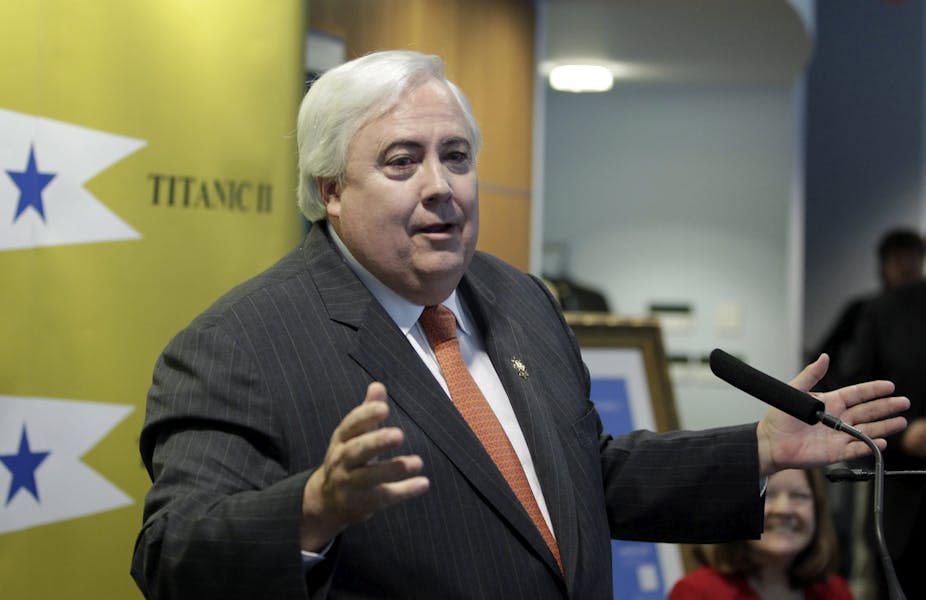Queensland has a habit of raising the eyebrows of our southern cousins when it comes to politics “our way”. Visits to friends and family down south always have required explanations about Joh Bjelke-Petersen, Joh for Canberra, Pauline Hanson, Bob Katter, Peter Beattie, and lately, Campbell Newman.
More recently it has been Clive Palmer, our very own mining magnate, reclaiming a bit of Australian political history and making a grand entrance onto the national stage. Mr Palmer is reviving the [United Australia Party (UAP) ](http://en.wikipedia.org/wiki/United_Australia_Party_(current) and says he wants to be Prime Minister - and since announcing his bold plan a week ago, the momentum behind him has been building.
The smarts behind the stunts
Best known nationally as the man who wants to build Titanic II and the franchise owner for a short time of a Gold Coast A-League soccer team, it would be easy for Mr Palmer’s latest venture into politics to be swamped by Titanic jokes and references to dinosaurs. But Mr Palmer has been a player in Queensland politics for decades. There is sufficient political savvy behind his pronouncements for us to take notice of his intentions.
On election night last year, I sat in the Queensland Electoral Commission’s Brisbane tally room and watched the live cross to the Liberal National Party (LNP) celebrations of their landslide win. The lasting image of that night was not of new premier Campbell Newman claiming victory: it was the loud, raucous offerings of a very excited LNP life-member, Clive Palmer.
Politics watchers here in Queensland were more than familiar with the financial resources Mr Palmer had poured into his beloved LNP; his history with the party and its antecedents was part of Queensland political lore; his role in the Joh for PM campaign is well-known. So whatever you think of the United Australia Party push, Mr Palmer is no political novice seeking to clumsily exert influence for his business interests.
The question some of us here in Queensland ask is “what went wrong, so quickly?”: from the joy of election night to the revival of an historic party and now seeing disaffected state MPs joining the UAP, starting with former LNP MPs turned independents Alex Douglas and Carl Judge.
Politics 101 for a new party
So what is the likelihood of success for the new UAP?
As my first-year politics student learnt in politics 101 last week, for Mr Palmer to ever become prime minister, he will need the majority support on the floor of the House to achieve that aim. He claims he will have 150 candidates ready, one for each seat in the lower house and candidates for the Senate.
Again, the 150 candidates is an ambitious aim, though not entirely impossible, but he does have a short lead-time to vet and check possible candidates. Mr Palmer has said he will nominate for the federal seat of Fairfax on the Sunshine Coast, a seat that adjoins Fisher, which itself is having an interesting stoush between newly-independent former Speaker Peter Slipper and the LNP candidate, former Howard Government minister Mal Brough. The Sunshine Coast has never had so much political attention.
Both federal seats are safe LNP seats and on-the-ground intelligence suggests that there is little likelihood that the seats will change hands. In drafting state members Dr Alex Douglas from the Gold Coast and former police officer Carl Judge from Brisbane, the UAP has its required sitting members in time for formal registration with the Australian Electoral Commission - though it is blurring the lines for the electorate between state and federal.
The UAP in this way is not unlike Queensland’s other conservative breakout group, the Katter’s Australia Party. Clive Palmer has also received strong endorsement from popular and respected state independent Peter Wellington, whose state boundaries intersect with the seat of Fairfax. That might garner some support from Wellington supporters when Clive comes doorknocking soon.
The perils ahead
I don’t doubt Mr Palmer will attract a reasonable number of votes if he stands. There is a lot of dissatisfaction with the major parties and people might like his rambunctiousness sufficiently to cast their vote his way. However, preferences will tell a big story here too. A first preference vote to UAP will send a message to the majors, but the second and third preferences will inevitably be directed to the more conservative side of politics. This will no doubt favour the LNP candidates.
Mr Palmer is here to make a larger-than-life impression, and he will. However, there will be further chapters to this story as the 14 September poll approaches, not the least of which will be the need to clear the air between the politics of this state and the state of politics nationally. Two state MPs do not yet a federal party make.
Mr Palmer’s grand ambition to be PM is unlikely to be realised this time. If he wants the UAP to succeed in the long-term, Mr Palmer needs to heed the lessons of his beloved Titanic. As captain of the ship, he is navigating into perilous political territory - so he will need to keep a close watch on where he is headed, rather than just charging in, full steam ahead.

